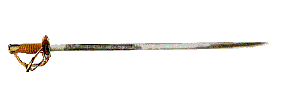WAGRAM

The Austrians had harbored resentment
against Napoleon for a long time. Since the disaster of 1805 the
Austrian army had undergone many changes under the Archduke Charles.
Though far from complete, the opportunity given them by Napoleon
was too great to pass up. While Napoleon was in Spain scattering
the rebels, Austria was gearing up for war. Napoleon was already
heading for France with the Imperial Guard when Soult was defeated
by Moore at Corunna. With Berthier commanding Army of Germany
while Napoleon was in Paris, the French where nearly mauled by
an advancing Austrian army at Eckmuhl. Napoleon arrived, called
Lannes back from his victories, and forced the Austrians into
retreat. Using the Danube as a natural barrier, Charles pulled
back his forces in an attempt to crush the French after they crossed.
At the battle of Aspern-Essling Napoleon's army was so badly mauled
that all his marshals and corps commanders wanted to retreat.
Napoleon, instead, built many bridges over the Danube and crossed
all at once. Crushing the Austrian advance guard observing them,
the French headed towards Wagram and the main Austrian Army. Napoleon
wanted to pin down the Austrians so that they wouldn't get away.
Oudinot's men fought into the village of Baumersdorf, taking 4
colors and 2000 prisoners from Brady's division. Archduke Charles
led a cavalry counterattack that forced the French to retire.
Marshal Macdonald was attacking to Oudinot's left and was fired
upon in the flank by Bernadotte's Saxons, followed by Charles
and his cavalry. During a night retreat they mistook friendly
cavalry for enemy and routed into the Imperial Guard. Bernadotte
was attacking Wagram with the support of 36 horse guns of the
guard, but didn't have enough of a corps present to make headway.
Dupas was particularly hard hit, and his command almost destroyed.
Davout to the east made some headway, but abandoned his successes.
The Austrians began the morning by attacking the French. Bernadotte
had abandoned a key position and was sent back to retake it, but
failed miserably. Artillery and the main brunt of the advance
severely damaged the Saxons, who broke. Napoleon relieved him
of command on the spot. Massena plugged the gap, until Eugene
could shift his army left. Klenau destroyed the French division
at Aspern and stopped to wait for Kolowrat. With 2 Austrian Corps
to his rear only Reynier's heavy artillery and Lasalle's and St.
Germain's cavalry kept the Austrians from cutting the French off
from their supplies. Massena swept down from the north and forced
the Austrians back, and then threw Klenau out of Aspern. Napoleon
sent Lauriston with 112 guns from the Guard, Wrede and Eugene
to stop Kolowrat. This devastating fire stopped them dead. Meanwhile
Nansouty kept Bellegarde occupied when Massena turned south. With
his rear secure, Napoleon now concentrated on the attack. Davout
attacked Rosenberg, and overran his batteries. Archduke Charles
arrived with much cavalry and saved the flank. But thousands of
cavalry fought until the French could move forward again. Sensing
victory, Napoleon ordered his Marshals to attack everything in
front of them. Davout destroyed Rosenberg and fell on Hohenzollern,
who was already fending off Oudinot. His line was quickly pierced,
and many were captured. Lauriston's grand battery advanced before
Macdonald's attack to punch a hole in the Austrian line, but was
badly coordinated. Cavalry support was foiled by Archduke Charles'
dispositions, and Macdonald suffered 80% casualties. He was supported
by Durutte, Wrede and Curial. Napoleon then sent Marmont to Oudinot's
left. Bellegarde and Hohenzollern melted away. Charles ordered
a general retreat. The battle of Wagram was a great victory, but
could have been a devastating defeat. As it was, the war didn't
end until 5 days later, as Charles was badly outmaneuvered at
Znaim. The French lost 32,500 at Wagram, including Lasalle, and
had lost Lannes at Aspern-Essling. The Austrians lost 43,000,
including 6,000 prisoners. A greater victory would have left a
smaller army in the field in the 1813-1814 campaigns. But worst
of all, the Austrians got Napoleon out of Spain, where he never
went back. Had he won in Spain, Napoleon would have had 200,000
extra men for the 1813 and 1814 campaigns!



